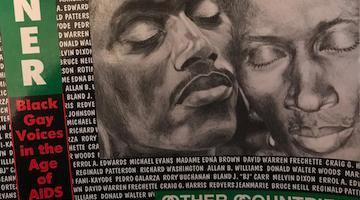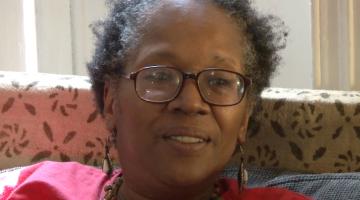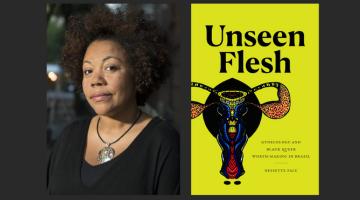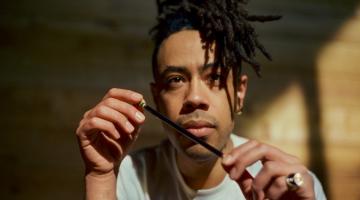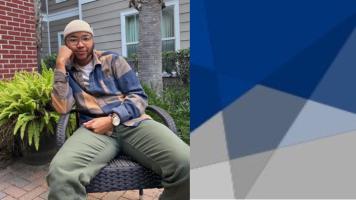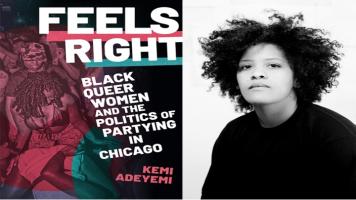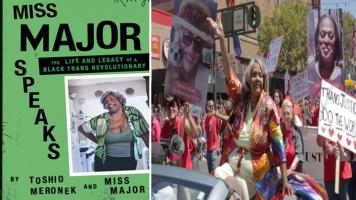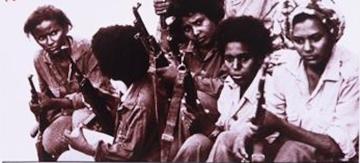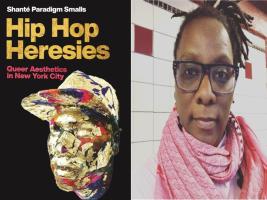In this series, we ask acclaimed authors to answer five questions about their book. This week’s featured author is Jafari S. Allen. Allen is Associate Professor of Anthropology and Director of the Center for Global Black Studies at the University of Miami. His book is There’s a Disco Ball Between Us: A Theory of Black Gay Life.
Roberto Sirvent: How can your book help BAR readers understand the current political and social climate?
Jafari S. Allen: It is now becoming clearer to many that, had we listened the first time, the intellectual and political positions introduced or reintroduced by radical Black lesbian feminists of the long 1980s might have made us freer today. Still, by and large, their Black gay intellectual history and its connection to longer Black radical traditions is largely unknown, poorly or partially read, or disregarded—making it difficult to see our current conjuncture. The current political moment cannot be understood or explained without accounting for the qualitative changes to the modes of community organizing, advocacy, and affect demonstrated in the work of Black gay activists, intellectuals, and artists of the long 1980s. Social science has failed to accurately frame the question of contemporary Black politics, for example, because it refuses to account for the moment at which the frameworks of the past were ruptured, then reconstituted by Black gay (that is, lesbian, gay, bisexual, and transgender) individuals and organizations.
Serious (re)consideration of the long 1980s shows us what happens when we reach what Cathy J Cohen describes as the boundary of Black politics; within a moment in which Black death is banal and expected, but also often ignored—resoundingly demonstrating that only particular Black lives matter (even to many Black folks and Black institutions). Today, this book asks how the long 1980s can be at once its own unrepeatable conjuncture and perhaps a usable record, or map, to navigate the violences, vulnerabilities and never-before-seen promise of this current moment.
Today, we are again faced with disproportionate effects of another pandemic that tapers off enough that those with the most resources can begin to feel as if they can disengage; within a political moment that vacillates between reactionary “wild west” type violence, to neoliberalism that can feel saner kinder-gentler to those who do not face the worst of its uninterrupted depravity; and in which Black people are featured being murdered in reality-media (whether by police, or slaughtered intramurally). In some ways, we have been here before. So, to once again/continue to disregard this vital work is to repeat a grave error that has made Black communities more vulnerable. In this book, I have tried to make good Black gay sense of the current moment, by remembering a Black gay politics that may be necessary for all our futures (you may also read: if we are to have any future).
What do you hope activists and community organizers will take away from reading your book?
I hope that activists and community organizers find affirmation of their life-affirming and lifesaving work in this book. I dearly hope that activists and community organizers I write about and those I have not yet met find resonance here—that I represented my understanding of their work respectfully and faithfully. I also hope that they will be inspired to continue their corollary work to document, archive and critically narrate their work; and take away a commitment to both hold scholars accountable and hold us in community. Finally, I’m nervous. This work is written in my own voice, and I know I can be earnestly bookish and make associations between scholarly and popular works that not everyone is into! I hope that activists and community organizers will take away the understanding that “accessible” writing does not have to mean reading that it is simple or easy or that each word or sentence is completely “clear.” Mine aren’t always. But they stay meaningfully layered. I hope community organizers and activists will trust their own readiness to engage in this conversation as knowledge producers, experts, and invested readers alongside many others gathered here.
We know readers will learn a lot from your book, but what do you hope readers will un-learn? In other words, is there a particular ideology you’re hoping to dismantle?
I began this work writing expressly and explicitly to my students, fellow travelers and future Black gay intellectuals and artists. Later, I realized that my “Dear Reader” must include Black folks who may be suspicious of what they think of as a “gay agenda.” I hope that this latter set of readers will fully and finally let go of the silly false dichotomy that poses Black or gay. This denies the reality that gay, trans, bi and queer folks have always existed in have already made tremendous contributions to our communities. I hope that readers will unlearn the lie that difference is something to be effaced, ignored, or blended.
I would be very grateful to contribute to one important set of beloved readers’ unlearning their pretention to singularly “own” the Black radical tradition.
If parts of the work make some folks uncomfortable—for example, because they do not find themselves central to this story—I hope that they can find the wherewithal to unlearn the need to be, or immediately identify with, the protagonists. That their ethical commitment will shift and build greater capacity.
I hope that some quarters of Black Studies will unlearn the lie that the only “quality of light” that is worthwhile is the one given by the “white fathers” of traditional ‘uni-disciplines’. That is, that we will appreciate, and champion modes of engagement and communication rooted in long and transnational Black radical intellectual traditions. That is, how we “describe,” “correct,” and “prescribe” (Marable) and that how we do as writers and storytellers constitutes content, not just “style.” (Relatedly: to get the most out of this work, readers will want to unlearn the widespread reading tactic of “skimming!”)
Who are the intellectual heroes that inspire your work?
There’s a disco ball between us: a theory of Black gay life is already a sort of tribute-- in conversation with foundational Black activists, intellectuals, and artists who have not only made this work possible, but also have inspired and set the conditions for the life I lead today. Their desires, works and possibilities (cut off too soon) breathed life into what would become my own. The Black radical intellectual tradition that I claim is long and deep. Still, it was the intellectuals/artists/activists of what I call the ‘anthological generation’ who authored the critical- global- Black gay- Black feminism- to which I am most centrally committed to contributing. So, the primary “heroes” of this work are those Melvin Dixon named “the epidemic dead, and the living.” Like Melvin himself, Pat Parker, Audre Lorde, Joseph Beam, Assotto Saint, Essex Hemphill, Marsha P. Johnson, June Jordan, Craig G. Harris, Joan Garner, Archie Freeman, Colin Robinson, for example, and the living who likewise created the new worlds that I inhabit, like Barbara Smith, Cheryl Clarke, Mandy Carter, Phil Wilson… and many others.
Some of my teachers, senior colleagues, and friends are also intellectual “heroes.” They have taken up the challenge to do their work “within” (but not of), outside, alongside and against the institution. Their heroism is in transforming their students and readers and building capacity for transformations and revolutions to come—grounded in community and committed to keeping themselves and their loved ones as well and well-loved as can be. Witnessing their work in the wider world and in ‘the literatures’ to correct, re-narrativize, make more livable space, and create anew, helps to keep me honest as a teacher and scholar-colleague.
In what way does your book help us to imagine new worlds?
The ‘future real conditional’ tense (which Tina Campt claims as a Black feminist tense) that we employ in this Theory of Black gay life helps us to imagine and live (as if) within a new Black world in which we are not only all fluent in each other’s histories as M. Jacqui Alexander has suggested, but also perhaps conversant in each other’s disparate or even contradictory desires. Now, there’s a Black (gay) agenda to linger and tarry with, together!
There’s a disco ball between us engages our political, intellectual and affective imaginations (and these are continuous, of course, not discrete) by narrating and re-narrating a collage portrait of alive Black gay worlds and Black queer worlds that are not “new.” We been here. This book thus offers a sincere invitation to engage a crucial step prior to “imagining new worlds.” As loyal as we have been to larger Black worlds in which we live (and die), and as much as we have already contributed, it is a dying shame that some of our sibling Black scholars still refuse to know us. The book invites us to, finally, know one another, as a primary step toward building liberatory new worlds. Again. This is a long-play remix, inviting you to dance.
Roberto Sirvent is editor of the Black Agenda Report Book Forum.

